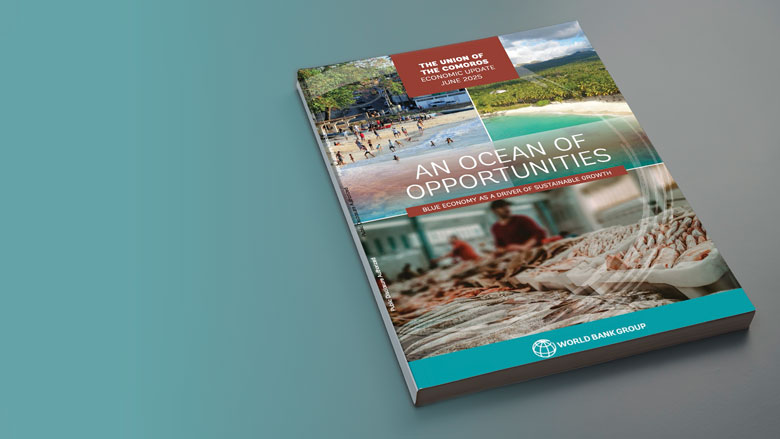The inaugural edition of the Comoros Economic Update, titled ‘An Ocean of Opportunities: Blue Economy as a Driver of Sustainable Growth,’ outlines recent economic trends and the medium-term outlook. The report highlights how the blue economy can stimulate growth, generate jobs, and safeguard ecosystems while ensuring sustainable resource management.
In 2024, Comoros’ economy experienced modest growth, increasing from 3% to 3.4%, fueled by household consumption and services, supported by rising remittances and easing inflation. Agriculture and industry also expanded, but per capita income stagnated, and poverty levels remained high. Public finances faced pressure as revenues stayed at 16.6% of GDP, while spending increased due to large externally financed projects, widening the fiscal deficit from 1.3% to 3.9%. Public debt rose to 36.8% of GDP, leading the IMF and World Bank to classify Comoros at high risk of debt distress. Remittances, averaging 11.3% of GDP over the past decade, remain crucial for household income but cannot offset trade imbalances or fund development. The banking sector remains fragile, with high non-performing loans and solvency issues limiting credit access and private sector growth. Inclusive reforms are needed to strengthen public finances, diversify the economy, and build resilience for sustainable growth.
Between 2025 and 2027, Comoros is projected to maintain steady growth, driven by private consumption and public investment, particularly in infrastructure and preparations for the 2027 Indian Ocean Island Games. Inflation is expected to decline, supported by reforms such as the liberalization of rice imports. However, the country continues to face macroeconomic challenges such as high import dependency, limited export diversification, and persistent inflationary pressures. WTO accession could open new markets but may reduce trade revenues without complementary policies. Climate change, natural disasters, and global volatility further threaten stability. Weak governance, high youth unemployment, and limited formal job creation constrain the country’s capacity to respond effectively to these challenges.
To ensure sustained growth, Comoros needs to reform fiscal policy, boost private sector growth, and strengthen governance to ensure resilience. With public debt projected at 37% of GDP in 2024 and domestic revenues among the lowest globally, fiscal space remains constrained. Key reforms include broadening the tax base, modernizing tax administration, and improving public financial management. Strengthening debt transparency and relying on concessional financing will be critical to mitigate debt distress. Private sector development requires removing regulatory barriers, expanding access to finance, and leveraging remittances. WTO accession offers export diversification opportunities, particularly in fisheries and agriculture, but must be supported by investments in trade logistics and quality infrastructure. Financial sector reforms are also needed to address high non-performing loans and expand financial inclusion. Improving governance, enhancing SOE oversight, and advancing decentralization, alongside stronger anti-corruption and judicial systems, will be essential to improve service delivery and build investor confidence.
— news from World Bank
— News Original —
Comoros Economic Update: An Ocean of Opportunities – Blue Economy as a Driver of Sustainable Growth
The first edition of the Comoros Economic Update, titled An Ocean of Opportunities: Blue Economy as a Driver of Sustainable Growth, presents recent economic trends and the medium-term outlook. The report’s focus section explores how the blue economy can drive growth, create jobs, and protect ecosystems while ensuring long-term resource sustainability.
Report Highlights
The economy is rising but remains insufficient to reduce persistent poverty and inequality
In 2024, Comoros’ economy grew modestly from 3% to 3.4%, driven by household consumption and services, supported by rising remittances and easing inflation. Agriculture and industry also expanded but per capita income stagnated, and poverty levels remained high. Public finances came under pressure. Revenues held steady at 16.6% of GDP, while spending surged due to large externally financed projects, widening the fiscal deficit from 1.3% to 3.9%. Public debt rose to 36.8% of GDP, prompting the IMF and World Bank to classify Comoros at high risk of debt distress. Remittances, averaging 11.3% of GDP over the past decade, remain a vital source of household income but cannot offset trade imbalances or fund development. The banking sector remains fragile, with high non-performing loans and solvency issues limiting credit access and private sector growth. Inclusive reforms to strengthen public finances, diversify the economy, and build resilience for long-term, sustainable growth are needed.
Despite a positive growth outlook, Comoros faces persistent macroeconomic risks and structural development challenges
Between 2025 and 2027, Comoros is projected to maintain steady growth, driven by private consumption and public investment, particularly in infrastructure and preparations for the 2027 Indian Ocean Island Games. Inflation is expected to decline, supported by reforms such as the liberalization of rice imports. However, the country continues to face macroeconomic challenges such as high import dependency, limited export diversification, and persistent inflationary pressures. WTO accession presents could open new markets, but may reduce trade revenues without complementary policies. Climate change, natural disasters, and global volatility further threaten stability. Weak governance, high youth unemployment, and limited formal job creation constrain the country’s capacity to respond effectively to these challenges.
To ensure sustained growth, Comoros needs to reform fiscal policy, boost private sector growth, and strengthen governance to ensure resilience
With public debt projected at 37% of GDP in 2024 and domestic revenues among the lowest globally, fiscal space remains constrained. Key reforms include broadening the tax base, modernizing tax administration, and improving public financial management. Strengthening debt transparency and relying on concessional financing will be critical to mitigate debt distress. Private sector development requires removing regulatory barriers, expanding access to finance, and leveraging remittances. WTO accession offers export diversification opportunities, particularly in fisheries and agriculture, but must be supported by investments in trade logistics and quality infrastructure. Financial sector reforms are also needed to address high non-performing loans and expand financial inclusion. Improving governance, enhancing SOE oversight, and advancing decentralization, alongside stronger anti-corruption and judicial systems, will be essential to improve service delivery and build investor confidence.
